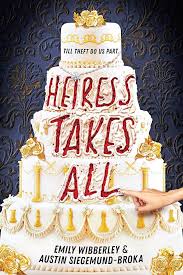One of the first questions we get upon meeting other writers or discussing our profession among new friends is how do you write together? The answer is rote to us by now, though the process is anything but. As married co-authors, we answer with jokes about how much we fight over every word in the novel, making light of some of the hardest days of collaborating. We admit how slow our pace is—how having two authors doesn’t allow us to do half as much work but to instead do everything twice. We each draft, we each edit, we each address each other’s edits. It can get very cyclical. When we deliver a “first” draft to our agent or editor, we have already gone over it at least twice each.
While we like to turn our conflict into humor, there are, of course, endless moments of joy and comfort in our collaboration. Work brings us together. When we fight over how a sentence should read or whether a paragraph should be longer or shorter, we may have different points of view, but we’re still looking at the same view. Every disagreement only feels like a disagreement in the moment. Over the course of our days and our lives, a fight over prepositional phrases and punctuation really is nothing more than one of us saying “I care about words and storytelling,” and the other replying, “I do, too.” Disagreements on the surface become similarities within our souls.
That’s not to mention how incredible it is to build a story with someone, or to have someone to share every high and low with. To know that the incredibly stressful deadline on the horizon isn’t going to take us away from our spouse, but instead to bring us even closer. We simply couldn’t imagine writing without the other. Yes, we logistically and functionally need each other—we each have different skills and removing one of us from our books would lead to a half as good product. But even if that weren’t true, we’d never care for it. We choose each other every day.
Perhaps it’ll come as no surprise that we have written ten romances together. Writing together is simply romantic. Through our own characters we get to fall in love with each other over and over.
And yet, ten books in we decided to write a heist novel, not a romance.
To be fair, there is romance in Heiress Takes All. We can’t resist. But for the first time in our romantic and professional history however, the romance is not the heart of the story. The heart of the story is crime.
There are many reasons we decided to make this pivot, but really all those reasons (the marketplace, the moment we were in in our career, financial considerations) were really why we could or should write a heist book, not why we did. The truth is, we wrote this book because we really, really wanted to.
Maybe there is a metaphor in here somewhere, one you might forgive us for not examining too closing. Everyone has heard of the seven-year itch. Here we are, literally seven years into writing romance together, and we suddenly have a desperate urge to tell a different kind of story. We wanted to construct something with high stakes, twists, villains, cliff-hangers. We wanted to test ourselves on a new field. The process was thrilling.
We got to see new sides of each other, got to admire and appreciate skills we never knew the other possessed. Heist novels involve elaborate plans—and creative solutions to those plans inevitably falling apart. They require large casts of heroes and villains, each with their own priorities that can lead to ever-shifting alliances. With every draft or brainstorming session, we challenged each other, finding new wrenches to throw into the heist we were building together, new directions for characters to take the plot, and new secrets to reveal.
Generally, one doesn’t welcome a spouse bringing twists into a marriage. Here, however, in the pages of our first heist together, we competed with each other to introduce new twists, upsetting the other’s carefully constructed plans. We found it to be a unique piece of our cowriting—one we’d never discovered in our previous novels—with two authors, we were able to build more reversals, some that even caught each other by surprise.
And in planning Olivia’s heist and the chaos she faces, we found ourselves writing our own relationship in a new way. The heart of every heist is collaboration, for without a crew, the plan and the narrative each cease to exist. We lent Olivia our feeling of having found complements for what we couldn’t devise on our own, and from her, we found reminders we needed to trust the crew—and the chaos. Unlocking a new genre like a once-sealed safe, we realized writing from a foundation of romance didn’t need to mean writing romance. Instead, we looked for our partnership and our romance within the architecture of a new genre, and we found an unexpected gift we learned we could give our own career.
In removing ourselves from romance, we had more fun writing with each other than we had in years. The chapters flew by as we uncovered hidden sides of each other and built something new together. While this book is not a romance, writing it felt like one—no matter how much crime filled our shared pages.
***


















